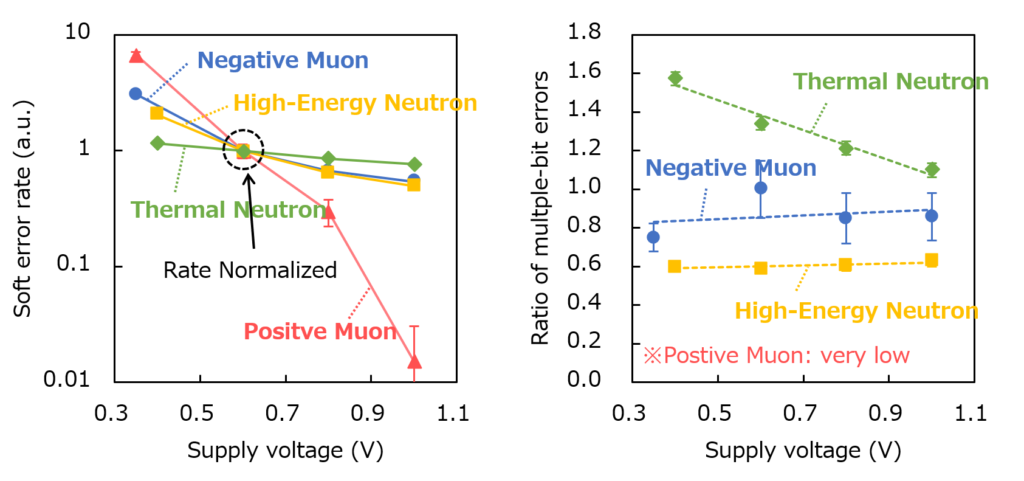Establishing evaluation and countermeasure technologies against environmental radiation
Yokohama, Japan, July 16, 2021 --Socionext Inc. has collaborated with researchers from Institute of Materials Structure Science at High Energy Accelerator Research Organization, Institute for Integrated Radiation and Nuclear Science at Kyoto University and Graduate School of Information Science and Technology at Osaka University, and has successfully demonstrated, for the first time, that the soft errors of semiconductor devices induced by muons and neutrons have different characteristics. The research group conducted experiments to irradiate semiconductor devices with negative and positive muon beams at Muon Science Facility (MUSE) of Materials and Life Science Facility (MLF), Japan Proton Accelerator Research Complex (J-PARC), thermal neutron beams at Kyoto University Research Reactor (KUR), and high-energy neutron beams at Research Center for Nuclear Physics (RCNP) of Osaka University, respectively. By using multiple types of quantum beams, the research group has achieved a comprehensive measurement of the effects of cosmic-ray muons and neutrons in environmental radiation. The encouraging results are expected to drive the development of effective evaluation method and countermeasures for soft errors caused by environmental radiation. The results are also expected to lead to the creation of highly reliable semiconductor devices that will support the future infrastructure.
The results of the research work have been published online in IEEE Transactions on Nuclear Science on May 21, 2021.
Part of this research work was supported by the "Program on Open Innovation Platform with Enterprises, Research Institutes and Academia (OPERA)" of the Japan Science and Technology Agency (JST).
Background
As semiconductor devices become more highly integrated and their operation voltage becomes lower, they are more prone to soft errors, which occur when electronic information is unexpectedly altered by radiation. There are concerns that soft errors by environmental radiation will cause more serious problems.
Previously, cosmic-ray neutrons in environmental radiation were considered as the main source of the problems to cause soft errors. On the other hand, for advanced semiconductor devices, which are highly integrated and use lower voltage, soft errors caused by muons, which are also derived from cosmic rays, have become a concern. Muons account for about three-quarters of all particles in cosmic rays that fall to the Earth, and it has been pointed out that they may cause a bigger problem than neutrons. However, there have been very few reports of soft errors caused by muons, and the difference between soft errors caused by neutrons and by muons has not been well understood.
Results
In this study, to understand the difference in soft errors caused by cosmic-ray muons and neutrons, the research group performed comparative evaluations by irradiating semiconductor devices with muons and neutrons. An SRAM circuit fabricated with 20-nm CMOS process technology has been used in this experiment. The SRAM was irradiated with each quantum beam, and the rate and the trend of soft error occurrence were analyzed by each of the particles.
It was found that there are clear differences between muons and neutrons in terms of supply voltage dependency of the error rate, the ratio of multiple-bit errors, as well as the characteristics of the multiple-bit error patterns. The result has been obtained for the first time in the world.

Supply voltage dependency of soft error rate (left) and ratio of multiple-bit errors (right)
Future
The results will lead to a development of technologies to effectively solve the problems caused by environmental radiation which includes muons. The difference of effects between muons and neutrons, which have been discovered in this study, will help establish an optimal design method to prevent soft errors. The results of this study are also expected to contribute to the evolution of evaluation method by numerical simulations.
In the future, the reliability of the infrastructure will depend on a vast number of semiconductor devices, and it is expected that evaluation and countermeasures against soft errors caused by environmental radiation will become even more important. Development of soft error evaluation using quantum beams, as was done in this study, is expected to lead to the creation of safer, securer, and more reliable semiconductor devices.
Article Information
Subject: Muon-Induced Single-Event Upsets in 20-nm SRAMs: Comparative Characterization with Neutrons and Alpha Particles
Authors: Takashi Kato1, Motonobu Tampo2, Soshi Takeshita2, Hiroki Tanaka3, Hideya Matsuyama1, Masanori Hashimoto4, Yasuhiro Miyake2
1Reliability Engineering Department, Socionext Inc.
2Muon Science Laboratory, Institute of Materials Structure Science, High Energy Accelerator Research Organization/ J-PARC
3Institute for Integrated Radiation and Nuclear Science, Kyoto University
4Graduate School of Information Science and Technology, Osaka University
Publication: IEEE Transactions on Nuclear Science
DOI: https://doi.org/10.1109/TNS.2021.3082559
Press Contacts
Corporate Planning Office, Socionext Inc.
Phone: +81-45-568-1006
https://www.socionext.com/en/contact/
Public Relations Office, High Energy Accelerator Research Organization (KEK)
Phone: +81-29-879-6046
[email protected]
Office for Global Communications, Kyoto University
Phone: +81-75-753-5727
[email protected]
Graduate School of Information Science and Technology, Osaka University
[email protected]
PR section, J-PARC Center
Phone: +81-29-284-4578
[email protected]
All company or product names mentioned herein are trademarks or registered trademarks of their respective owners. Information provided in this press release is accurate at time of publication and is subject to change without advance notice.

